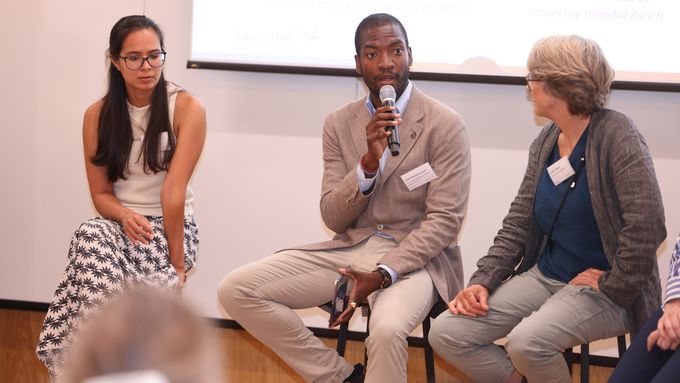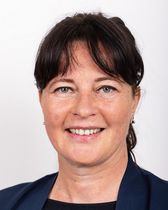Swiss TPH Symposium: Improving Healthcare for People with Chronic Diseases
02.09.2025
The growing burden of chronic diseases, driven by ageing populations and increasing health inequities, requires a fundamental shift in how care is organised. There lies great potential in better linking health and social systems – but how can this be achieved? Today’s symposium at the Swiss Tropical and Public Health Institute (Swiss TPH) on “Integrated People-Centred Care” brought together over 80 experts from health and social care, public administration, research and the private sector. The participants presented innovative models for chronic disease management, discussed the potential of digital tools to improve care coordination and shared experiences from patients and providers, from Switzerland and internationally, including Eastern Europe and the Balkans.

Panelists discussed patient experiences. Photo: Joachim Pelikan, Swiss TPH
Chronic diseases are the leading cause of disabilities and death worldwide. They include diverse conditions ranging from cardiovascular diseases and diabetes to musculoskeletal diseases (such as rheumatism), genetic disorders (such as sickle cell disease), and mental health conditions. Chronic patients and people with disabilities often face complex needs that require long-term or even lifelong care. This makes close cooperation between doctors, nurses, social services, relatives and other care partners essential.
“Integrated people-centred care aims to take a more holistic view that is tailored to the needs of patients and that builds bridges between the various actors in the system”, said Jana Gerold, project leader at Swiss TPH and member of the organising committee. “With today’s symposium, we are bringing together Swiss and international experts from research, healthcare, the public and private sector as well as patient representatives to foster dialogue and align efforts across sectors, disciplines and countries.”
Digital innovations and policy reform
Participants shared experiences from local, national and international contexts, ranging from cantonal initiatives to improve coordination of care, to innovative and system-strengthening projects in countries such as Brazil, Kosovo, Moldova, Tanzania and Ukraine. Experts agreed that fragmented systems must be bridged, and that patients and providers should be more closely involved in shaping the future of care delivery. “One of the key challenges we face is the lack of data on people-centred care. Yet people-centredness is fundamental to ensuring that health systems respond to people's real needs, values and preferences, and ultimately contributes to the achieving universal health coverage,” said João Breda, from the World Health Organization.
Several speakers presented digital innovation as a critical enabler, offering tools to strengthen coordination and improve care. Others emphasised the need for policy reform to break down silos, establish clinical guidelines and prioritise prevention to reduce the number of people who develop chronic diseases in the first place.
Swiss TPH’s role in integrated care
One example of innovative integrated practice is the “Réseau de l’Arc”. It is Switzerland’s first integrated healthcare model, launched in 2024 in the Jura region. It brings together health insurers, service providers and public authorities to overcome traditional boundaries in the Swiss system. Patients benefit from coordinated pathways of care, including prevention services, chronic disease management and a dedicated gatekeeper who ensures continuity across providers. Swiss TPH, together with the Basel Center for Health Economics, conducts independent implementation research on Réseau de l’Arc. By evaluating its impact on quality, access and costs of care, they contribute evidence on how integrated models can shape the future of healthcare in Switzerland and inform policy debates beyond the Jura.
On behalf of the Swiss Agency for Development and Cooperation, Swiss TPH also implements projects on integrated people-centred care in Kosovo, Moldova and Ukraine.
Integrated care: patient and health system perspectives
One panel discussion placed the perspectives of patients at the centre, highlighting their experiences, expectations and needs in relation to integrated care. “Living with arthritis and osteopenia, I have seen how different specialists in the same hospital often don’t work together. What matters most to patients is coordinated treatment and being asked what truly matters to them”, said Judith Safford from the RheumaCura, a foundation for patient-centred research in the field of rheumatic and musculoskeletal diseases.
A second panel discussion looked at integrated care from a health systems perspective. “In times of shrinking budgets, we must reprioritise and invest where it is most effective and cost-efficient. Supporting integrated health systems and strengthening primary care is essential – but we also need to address broader determinants of health, such as migration or nutrition. This requires a systemic approach and reshaping health financing, which is still too often vertical,” said Erika Placella from the Swiss Agency for Development and Cooperation (SDC).
A key outcome of the symposium will be the publication of a white paper, capturing the main insights and recommendations. This document will serve as a resource for policymakers, practitioners and researchers in Switzerland and internationally, guiding the development of strategies that place people at the centre of care.
Exhibition of patient stories The symposium also hosted an exhibition with personal stories of people living with chronic conditions, entitled “Everyday Things: Life with a Chronic Condition.” It featured personal objects and portraits from patients and caregivers in Kosovo, Moldova, Switzerland and Ukraine. From insulin pens to family photos, they highlighted the often-overlooked struggles, adaptations and resilience of people living with chronic conditions. Following its launch at the symposium, the exhibition will be expanded in the future with contributions from other countries and serve as a tool for advocacy and education on patient-centred integrated care. Explore the virtual exhibition here |
Contact

Jana Gerold
PhD, Dr.
Project Leader
+41612848761
,
-
jana.gerold@swisstph.ch
Stay connected
Subscribe to our newsletter and get all the latest research news, project updates, course and event listings from Swiss TPH.